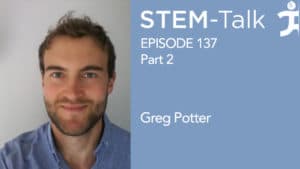Greg Potter talks sleep quality, influences in STEM-Talk episode 137
Published 6.17.22
Sleep is a precious commodity — especially if you struggle with it. Nutrition, exercise, lifestyle, and circadian biology are an interrelated web with tremendous influence on the quality of our sleep.
In the latest episode of STEM-Talk (episode 137), we pick up a conversation with Dr. Greg Potter in an interview where he explores topics including insomnia, sleep apnea, time-restricted eating, exercise, nutrition, and supplementation. The first part of our interview (STEM-Talk episode 136) with Potter brought a deep-dive into circadian biology, sleep, diet, and metabolism.

Visit https://www.ihmc.us/stemtalk/episode-137/ to listen to the full conversation with Greg Potter.
Potter ‘s work has been featured in the BBC World Service, the Washington Post, Reuters and other scientific journals and news outlets. Some of Potter’s conversation with IHMC’s CEO and founder Dr. Ken Ford in episode 137 touches on whether there is a biological basis for the idea of chronotypes, a concept that some people are better suited to an earlier or later sleep schedule.
So, is there such a thing — biologically — as morning larks and night owls?
“I think the chronotype does exist in both human and non-human animals” but it is hard to work out the influence of genetics and environment.,” says Potter, who cites a study about the impact of camping on early birds and night owls.
In this study, once folks were camping, their biological clocks synced very strongly with the environmental clock — and the difference between the early and late risers shrank noticeably. The late risers’ biological clocks moved back to more closely match the early risers, who were in general already closer to the environmental day-night cues from nature.
Ford and Potter also talk about chrononutrition, the relationship between a person’s nutrition and their body clock. What you eat influences the function of your body clock, because your clock optimizes your body for certain processes at certain times of day. The question is whether you can use that understanding to optimize your diet.
Some key terms for this conversation: Time-restricted eating. (restricting eating to a period of 12 hours or less each day). Intermittent fasting is periodic use of a fast of 24 hours or longer.
Potter’s key takeaways:
- “If we think about the day beginning when you wake up, you should wait before you consume anything other than water. At least an hour, especially if you awaken in the “biological night” because you likely have a good deal of melatonin circulating in your body.
- Time-restricted eating using a 6- to 12-hour “eating window” is a good way to go for most people. Base your “eating window” on what your goals are. If you currently eat over a 14-hour period, don’t jump straight to an 8-hour eating window. Start with a 12-hour window, then back it down. If your goal is to lose weight, using an 8-hour window might be preferable.
- In general, a shorter eating window is well-suited to the ketogenic diet. The longer fasting period is likely to accelerate the ketosis period. So, if you are just starting on the ketogenic diet, you might want to implement time-restricted eating to make it more straightforward.
- Wait maybe 3 to 6 hours between meals. If you eat more frequently than that, if you are interested in your body composition, you might not be able to maximally stimulate muscle tissue synthesis over time.
- Front-loading intakes matters. Studies have shown that front-loading — eating a big breakfast followed by smaller meals as the day goes on — can help weight loss and blood sugar control.
- When you exercise also matters. If you exercise in the afternoon, you don’t need to worry so much about front-loading because of the influence exercise has on metabolism.
- Distribute your protein intake relatively evenly throughout the day. A lot of people have loads of protein at dinner and little at breakfast. With respect to body composition, that’s not ideal. At each meal, you need enough protein to maximally stimulate muscle protein synthesis. And at the end of the day, stop eating two hours before bedtime.
There is a school of thought that we should re-engineer our lifestyles to better mimic certain aspects of our distant ancestors to protect ourselves from chronic diseases and boost our energy levels. While that may not be practical in total, Potter says there are aspects of our ancient ancestors’ lives we ought to emulate.
- Eat food that is minimally processed and locally available.
- Build physical activity around eating. Studies show a 20-minute walk after eating improves blood sugar response.
- Spend enough time outdoors in daylight and keep the sleeping area dark.
- These people shared everything – food, caregiving responsibilities in a fairly un-hierarchical life. Community and connection is important not only for our biological, but also our social well-being.
Listen to the full conversation here.
Latest News
- STEM-Talk: Pascal Lee on returning to the Moon — and heading to Mars
- Aging Symposium draws experts to IHMC
- IHMC hosts Fredric G. Levin Lung Care Symposium March 27-28 in Pensacola
- Humanoid robotics and exoskeletons lead latest IHMC newsletter
- Celebrate Robotics Week at IHMC Open House on April 11, 2025
- Registration open for 2025 Summer Robotics Camp
- STEM-Talk: JP Errico on vagus-nerve stimulation, inflammation and chronic disease management
- STEM-Talk: Karl Herrup on shortcomings of Alzheimer’s research
- Pensacola attorney joins IHMC Board of Directors

